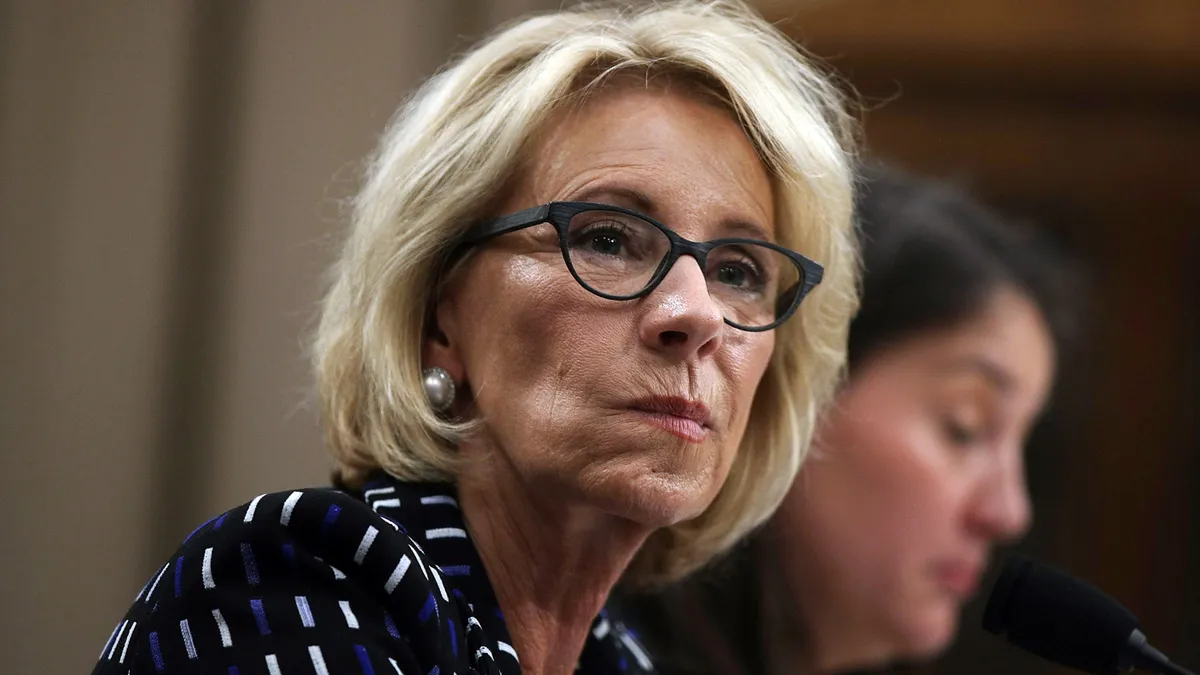Harvard and Yale universities are the latest institutions targeted in the U.S. Department of Education's crackdown on colleges that it claims have failed to report gifts and contracts from foreign entities.
The department announced Wednesday that it is investigating the institutions for potentially neglecting to inform officials about hundreds of millions of dollars worth of foreign donations and contracts.
The federal inquires are the latest in a saga that began last year. In June and July, the department sent letters to Cornell, Georgetown, Rutgers and Texas A&M universities alleging they had not complied with a requirement of the Higher Education Act that postsecondary institutions report contracts and donations from foreign sources that exceed $250,000. The department opened investigations into these institutions’ ties with countries such as Qatar and China.
In September, Massachusetts Institute of Technology and the University of Maryland, College Park received similar letters and are subject to the same investigations.
Institutions' links to China, in particular, were already under federal scrutiny. A report last year from a Senate subcommittee investigation unearthed that nearly 70% of U.S. institutions receiving more than $250,000 from one Chinese entity did not disclose those payments within a calendar year, as required. That body, Hanban, is affiliated with the the Chinese Ministry of Education and manages Confucius Institutes, which teach language and culture at U.S. colleges, but have come under fire for concerns that they restrict academic freedom.
"Foreign government spending on U.S. schools is effectively a black hole, as there is a lack of reporting detailing the various sources of foreign government funding," the subcommittee report states.
Following that report, the Education Department made an emergency request to the Office of Management and Budget, proposing new standards for reporting foreign funding, which more than two dozen higher ed groups criticized. It argued the new requirements — an extensive checklist that administrators would file to the department twice a year — extended far beyond what federal law intended and would consume too much manpower.
The department dropped the emergency request but filed a near identical proposal in the Federal Register this month, again under the Paperwork Reduction Act. The groups had criticized the department for truncating the process by not altering the reporting requirements through regulation.
Education Dive reviewed the two department submissions and identified only one change: Colleges would no longer have to upload documentation of a gift or contract to the federal government, which would have been made public. Steven Bloom, the American Council on Education’s (ACE) government relations director, told Education Dive in November that the association was concerned this provision would force universities to reveal traditionally private information.
ACE and other higher ed groups pressed the department to clarify the reporting requirements on multiple occasions last year, but said they were unsuccessful.
Inquiries continue
The revelation that Harvard and Yale are under investigation — along with the revamped proposal — indicate the department is unlikely to retreat from its crusade on this issue.
"This is about transparency," Education Secretary Betsy DeVos said in a statement on Wednesday. "If colleges and universities are accepting foreign money and gifts, their students, donors, and taxpayers deserve to know how much and from whom."
In a letter to Yale dated Feb. 11, the department claimed the university didn’t report any foreign money or contracts from 2014 to 2017, despite it having a considerable international presence. This would total at least $375 million, the department said in its announcement.
It indicated to Harvard in a separate letter the same day that it believed the institution "lacks appropriate institutional controls" that would result in it not fully reporting its foreign gifts and contracts. In its public announcement of the investigations, the department honed in on the accusations against Charles Lieber, chair of Harvard’s chemistry and chemical biology department, who was charged last month with lying to federal officials about funding he received from China.
The department asked Harvard for records concerning China and two of its telecommunications giants, Huawei and ZTE Corp., which some U.S. officials have characterized as security risks.
A Yale spokesperson did not respond to Education Dive’s request for comment, but the university has told other news outlets it is preparing a response to the department.
Harvard spokesperson Jonathan Swain confirmed in an email to Education Dive Wednesday that the university received the department’s notice and is preparing to respond. He said he could not share further information.
The department said its heightened enforcement efforts led to about $6.5 billion in previously undisclosed foreign money being reported from colleges since July 1, 2019. That includes $3.6 billion from 10 high-profile institutions: Boston, Carnegie Mellon, Cornell, MIT, Texas A&M and Yale universities, as well as the University of Chicago, the University of Colorado Boulder, the University of Pennsylvania and the University of Texas MD Anderson Cancer Center.























